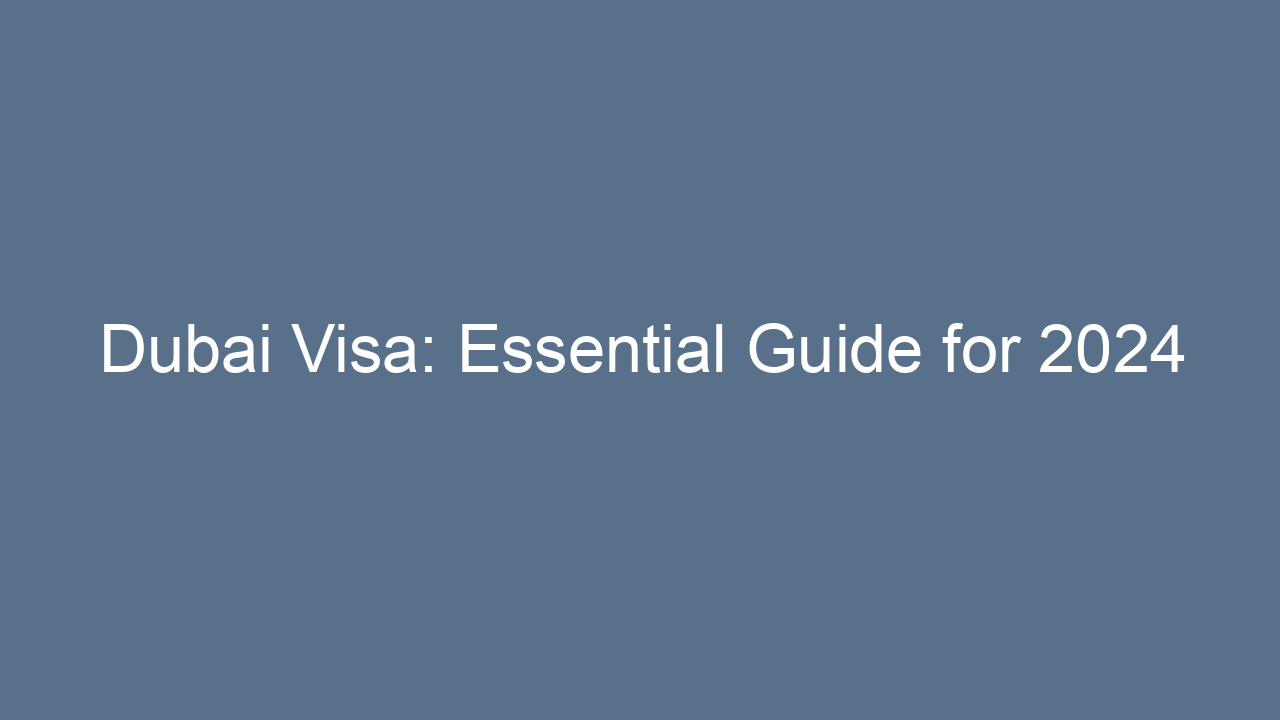Dubai Visa: Essential Guide for 2024

Navigating Dubai Visas in 2024: Your Essential Guide for a Smooth Journey
Getting the right Dubai visa for your trip is crucial for a hassle-free experience. This guide simplifies the process, covering all you need to know for 2024, whether you’re a tourist, business traveler, or looking to extend your stay.
Key Takeaways
- Understand visa types for your Dubai visit.
- Gather essential documents for a successful application.
- Learn the simplified online application process.
- Discover visa validity and extension options.
- Know common pitfalls to avoid for a smooth entry.
Dubai Visa Requirements: What You Need to Know
Planning a trip to Dubai is exciting, and securing the correct visa is a vital first step. Many visitors find the process a bit confusing, with different rules for various nationalities and visit durations. This guide is designed to put your mind at ease. We’ll walk you through everything you need to know about Dubai visas in 2024, breaking down the requirements and application steps into simple, actionable advice. You’ll feel confident and prepared for your journey to this magnificent city. Let’s start by understanding the basic types of visas available.
Understanding Dubai Visa Categories for 2024
Dubai offers a variety of visa options to suit different travel purposes and durations. As a traveler, understanding which category your visit falls into is the first crucial step. This ensures you apply for the correct permit, avoiding any last-minute issues or rejections. The visa landscape is generally divided into short-term and long-term stays, with specific visas for tourism, business, transit, and more.
Short-Term Visas
These are ideal for tourists and visitors making brief trips. They typically allow stays of 30 or 60 days, depending on the specific visa and your nationality.
- 30-Day Tourist Visa: This is the most common visa for short leisure trips. It allows a single entry and is usually valid for 60 days from the date of issue, with a maximum stay of 30 days.
- 60-Day Tourist Visa: For those who wish to explore Dubai and the UAE at a more relaxed pace, this visa extends the permissible stay to 60 days. Like the 30-day visa, it’s typically valid for 60 days from issuance and allows a single entry.
- Transit Visa: If Dubai is merely a stopover on your journey to another destination, a transit visa might be suitable. These are often available for 48 or 96 hours and are facilitated through airlines or authorized travel agencies. They are strictly for transit purposes and not for extended stays or tourism.
Long-Term Visas
These are designed for individuals planning to stay in Dubai for extended periods, often for work, study, or investment purposes.
- 1-Year Multiple-Entry Visa: This allows holders to enter and exit the UAE multiple times within a one-year period. It’s often used by business professionals who frequently travel to Dubai for meetings or collaborations.
- 2-Year Multiple-Entry Visa: Similar to the 1-year visa, but valid for two years, offering even greater flexibility for frequent visitors.
- 10-Year Golden Visa: This is a long-term residency visa for investors, entrepreneurs, specialized talents, and researchers. It offers significant benefits, including a renewable 10-year stay without the need for a national sponsor.
- Retirement Visa: For individuals aged 55 and above who meet specific financial requirements, this visa allows them to retire in Dubai for up to five years, with the possibility of renewal.
Visa-Free Entry
It’s important to note that citizens of certain countries are exempt from needing a visa for short stays. You can check the official UAE government portal for the most up-to-date list of visa-exempt nationalities.
Essential Documents for Your Dubai Visa Application in 2024
To ensure your Dubai visa application is smooth and successful, preparing the correct documents is paramount. While requirements can vary slightly based on your nationality and the type of visa you’re applying for, there’s a core set of documentation that is almost always needed. Having these ready will significantly speed up the process and reduce the chances of delays or rejections.
Commonly Required Documents:
- Passport: Your passport must be valid for at least six months beyond your intended stay in Dubai. Ensure it has at least two blank pages for visa stamps.
- Visa Application Form: Accurately completed application forms are essential. These are usually available online through the official immigration portal or through authorized travel agencies.
- Passport-Sized Photographs: You’ll need recent photographs meeting specific requirements (often white background, passport-sized, and clear).
- Proof of Accommodation: This could be hotel bookings or a letter of invitation from a host in Dubai.
- Flight Itinerary: Return flight tickets are usually required to demonstrate your intention to leave the UAE once your visa expires.
- Proof of Financial Means: Some visa types may require bank statements or a sponsorship letter to show you can support yourself during your stay.
- Emirates ID (if applicable): For residents applying for extensions or certain other visa types.
Additional Documents for Specific Visa Types:
- Business Visa: A letter of invitation from the sponsoring company in Dubai and a copy of the company’s trade license.
- Student Visa: An acceptance letter from an accredited educational institution in Dubai and proof of tuition fees paid.
- Investor Visa: Supporting documents related to the investment, such as company registration and proof of funds.
It is always recommended to check the official website of the General Directorate of Residency and Foreigners Affairs (GDRFA) or inquire with your chosen airline or travel agent for the most precise and current document checklist for your specific situation.
Applying for Your Dubai Visa Online: A Step-by-Step Guide
The digital age has made applying for a Dubai visa more accessible than ever. The UAE government and authorized airlines/travel agencies offer online application processes that are straightforward and efficient. This allows you to complete most of the steps from the comfort of your home or office.
The Online Application Process:
- Identify the Right Visa: First, determine which visa category best suits your travel purpose and duration.
- Choose Your Application Channel: You can typically apply through:
- The official UAE government portal (e.g., GDRFA website).
- Your sponsoring airline (e.g., Emirates, Etihad, Flydubai).
- An authorized travel agency.
- Fill Out the Application Form: Complete the online application form accurately and honestly. Ensure all personal details, passport information, and travel dates are correct.
- Upload Required Documents: Scan and upload clear copies of all necessary documents as specified by the portal or agency. This usually includes your passport, photograph, and any supporting documents.
- Pay the Visa Fees: Visa fees vary depending on the type of visa and its validity. Payments are usually made online via credit or debit card.
- Submit Your Application: Once all details are checked and payment is confirmed, submit your application.
- Track Your Application: You will typically receive a confirmation email with an application reference number. You can use this to track the status of your visa application online.
- Receive Your Visa: If approved, your visa will usually be issued electronically and sent to your registered email address. It’s recommended to print a copy to carry with you.
The processing time can vary, but for many short-term tourist visas, it can take anywhere from 24 to 96 hours. However, it’s always advisable to apply well in advance of your travel date to allow for any unforeseen delays.
Visa Validity and Extension Options in Dubai
Understanding how long your Dubai visa is valid and the possibilities for extending your stay is crucial for proper planning. Dubai offers flexibility, but it’s essential to adhere to the rules to avoid penalties.
Visa Validity:
The validity of your visa is determined at the time of issuance and depends on the visa type. A tourist visa, for instance, has a defined period of stay (e.g., 30 or 60 days) and is also subject to an entry validity period (usually 60 days from issuance). It’s important to differentiate between the “period of stay” allowed and the “validity period” within which you must enter the country.
Extending Your Stay:
For many short-term visa holders, it’s possible to extend their stay without leaving the country. This usually involves applying for a visa extension through the GDRFA.
- Visa Extension for Tourists: Visitors on 30-day or 60-day tourist visas can often extend their stay for an additional period (e.g., 30 days) by paying an extension fee. This process can typically be done twice, allowing for a longer overall stay.
- Requirements for Extension: The general requirements for an extension typically include the original visa, passport, and a fee. You may need to visit an immigration office or process it online through authorized channels.
- Exit and Re-Entry: If you need to leave Dubai and return shortly after, and your initial visa allows for single entry, you’ll need to apply for a new visa. However, for certain long-term visa holders or specific situations, multiple-entry visas are available, allowing you to exit and re-enter the UAE multiple times within the visa’s validity period.
Always check the latest regulations with official sources, as policies can change. Overstaying your visa can result in significant fines and potential travel bans, so staying informed is key.
Common Dubai Visa Pitfalls and How to Avoid Them
While the Dubai visa process is generally efficient, certain common mistakes can lead to delays or rejections. Being aware of these pitfalls can help you navigate the application smoothly and ensure a hassle-free entry into the UAE.
Key Pitfalls to Avoid:
- Incorrect Personal Information: Ensure your name, passport number, and other details on the application form exactly match your passport. Even minor discrepancies can cause issues.
- Insufficient Passport Validity: Double-check that your passport has at least six months of validity remaining from your intended date of entry.
- Unclear or Invalid Photographs: Uploading photos that don’t meet the required specifications (e.g., wrong background color, poor quality, outdated) can lead to rejection.
- Missing Supporting Documents: Failing to provide all the necessary documents as per the visa type can halt your application. Always refer to the official checklist.
- Applying Too Late: While some visas are processed quickly, it’s wise to apply at least a few weeks before your travel date to account for potential processing delays.
- Overstaying Previous Visas: If you have a history of overstaying in the UAE, it might impact future visa applications. Ensure you comply with all previous visa terms.
- Using Unofficial Agents: Be cautious of unofficial visa agents who may charge exorbitant fees or provide misleading information. Stick to airlines or officially recognized travel agencies.
By paying close attention to these details and utilizing official channels, you can significantly reduce the chances of encountering problems and ensure your journey to Dubai is as seamless as possible.
Dubai Visa Fees and Processing Times in 2024
Understanding the costs associated with a Dubai visa and how long it typically takes to process is crucial for budgeting and planning your trip. These factors can vary based on the visa type and the applicant’s nationality.
Typical Visa Fees:
Visa fees in Dubai are subject to change and depend on several factors:
- Visa Type: Short-term tourist visas are generally less expensive than long-term or multiple-entry visas.
- Visa Duration: A 30-day visa typically costs less than a 60-day visa.
- Nationality: While many nationalities are now eligible for visa-on-arrival or visa-free entry, for those requiring a pre-approved visa, fees can vary.
- Processing Speed: Some service providers offer an expedited processing option for an additional fee.
For example, a standard 30-day tourist visa application processed through an airline or a reputable travel agency might range from AED 300 to AED 600 (approximately $80 to $160 USD), though this is a broad estimate.
Estimated Processing Times:
Processing times can also fluctuate:
- Standard Processing: For most tourist visas, expect processing times to range from 24 to 96 working hours (approximately 1-4 business days).
- Expedited Processing: If you need your visa urgently, some services offer expedited processing, which can reduce the time to 24-48 hours, often at a higher cost.
- Peak Seasons: During peak travel seasons (like holidays), processing times might extend due to higher application volumes.
- Weekends and Public Holidays: Remember that weekends (Friday and Saturday in the UAE) and public holidays are not considered working days, which can affect processing timelines.
Dubai Visa Fee & Processing Time Estimates (2024) |
||
| Visa Type | Estimated Fee (AED) | Estimated Processing Time |
| 30-Day Tourist Visa | 350 – 550 | 1-4 Business Days |
| 60-Day Tourist Visa | 500 – 750 | 1-4 Business Days |
| Transit Visa (48/96 Hours) | 200 – 400 | 24-72 Hours |
| 1-Year Multiple Entry Visa | 800 – 1200 | 3-7 Business Days |
Note: These are approximate figures and are subject to change by authorities. Always verify current fees and times with your chosen application channel.
Visa on Arrival and Visa-Free Options for Select Nationalities
Dubai is committed to making travel accessible, and for citizens of many countries, the entry process is significantly simplified. This includes options for visa-on-arrival and visa-free entry, which can save considerable time and effort in advance planning.
Visa-On-Arrival Facilities:
Citizens of numerous countries are eligible for a visa upon arrival at Dubai International Airport (DXB) or other UAE entry points. This typically grants them a stay of 30 or 90 days, depending on their nationality.
- Countries Eligible for 30-Day Visa on Arrival: This list includes citizens from countries like India, Pakistan, Sri Lanka, and many others. The visa is usually issued for 30 days and can often be extended for another 30 days.
- Countries Eligible for 90-Day Visa on Arrival: Holders of passports from countries such as the United States, Canada, the United Kingdom, Australia, and many European Union member states are usually granted a 90-day visa on arrival. This visa typically allows for multiple entries within its validity period.
To utilize the visa-on-arrival facility, travelers usually need a passport valid for at least six months and may be required to present proof of onward travel and sufficient funds.
Visa-Free Entry for Specific Nationalities:
A select number of nationalities can enter the UAE without a pre-arranged visa for short tourist stays. These travelers are granted entry for specified periods, often up to 90 days within a 180-day period.
Where to Find the Official Lists: The most accurate and up-to-date information on visa-on-arrival and visa-free entry eligibility can be found on the official website of the UAE Federal Authority for Identity, Citizenship, Customs & Port Security (ICP). It is strongly recommended to consult this resource before your travel, as lists can be updated.
Always carry your passport and any other required travel documents when you arrive in Dubai. Immigration officers at the port of entry will make the final decision on your admittance.
Frequently Asked Questions About Dubai Visas (2024)
- Q1: Do I need a visa to visit Dubai in 2024?
- A1: It depends on your nationality. Citizens of many countries can get a visa on arrival or are visa-exempt for short stays. For others, a pre-approved visa is required. Always check the latest requirements for your specific passport.
- Q2: How can I apply for a Dubai visa if I’m not eligible for visa-on-arrival?
- A2: You can apply online through the official UAE government portal, your sponsoring airline (like Emirates or Flydubai), or an authorized travel agent. Ensure you have all required documents ready.
- Q3: What is the difference between a 30-day and a 60-day Dubai visa?
- A3: Both are short-term tourist visas. The 30-day visa allows you to stay for up to 30 days, while the 60-day visa allows for a stay of up to 60 days. Both are typically valid for 60 days from the date of issue.
- Q4: Can I extend my tourist visa without leaving Dubai?
- A4: Yes, in many cases, short-term tourist visas (30 or 60 days) can be extended for an additional period (e.g., 30 days) by paying an extension fee through the General Directorate of Residency and Foreigners Affairs (GDRFA).
- Q5: What happens if I overstay my Dubai visa?
- A5: Overstaying your visa can lead to significant fines, potential travel bans from the UAE, and other legal consequences. It’s crucial to adhere to your visa’s expiry date.
- Q6: How long does a Dubai visa application usually take?
- A6: Standard processing for tourist visas typically takes 1-4 business days. However, it’s best to apply several weeks in advance to allow for any potential delays or unexpected issues.
- Q7: Are there any restrictions on applying for a Dubai visa?
- A7: Visa applications can be rejected if applicants have previous immigration violations in the UAE, fail to meet financial requirements, or provide incomplete/inaccurate information. Also, individuals with certain medical conditions might face additional scrutiny or be denied entry.
Pro Tip: Always keep a digital and physical copy of your visa and passport accessible during your trip.
Conclusion
Navigating the Dubai visa process for 2024 is straightforward when you are well-informed. By understanding the different visa categories, gathering the necessary documents, and following the online application steps diligently, you can secure your entry into this vibrant city with confidence. Remember to always check the latest official guidelines for your specific nationality and travel purpose. With this essential guide, your journey to Dubai will be a seamless and enjoyable experience, allowing you to focus on the incredible sights and sounds this global destination has to offer.






